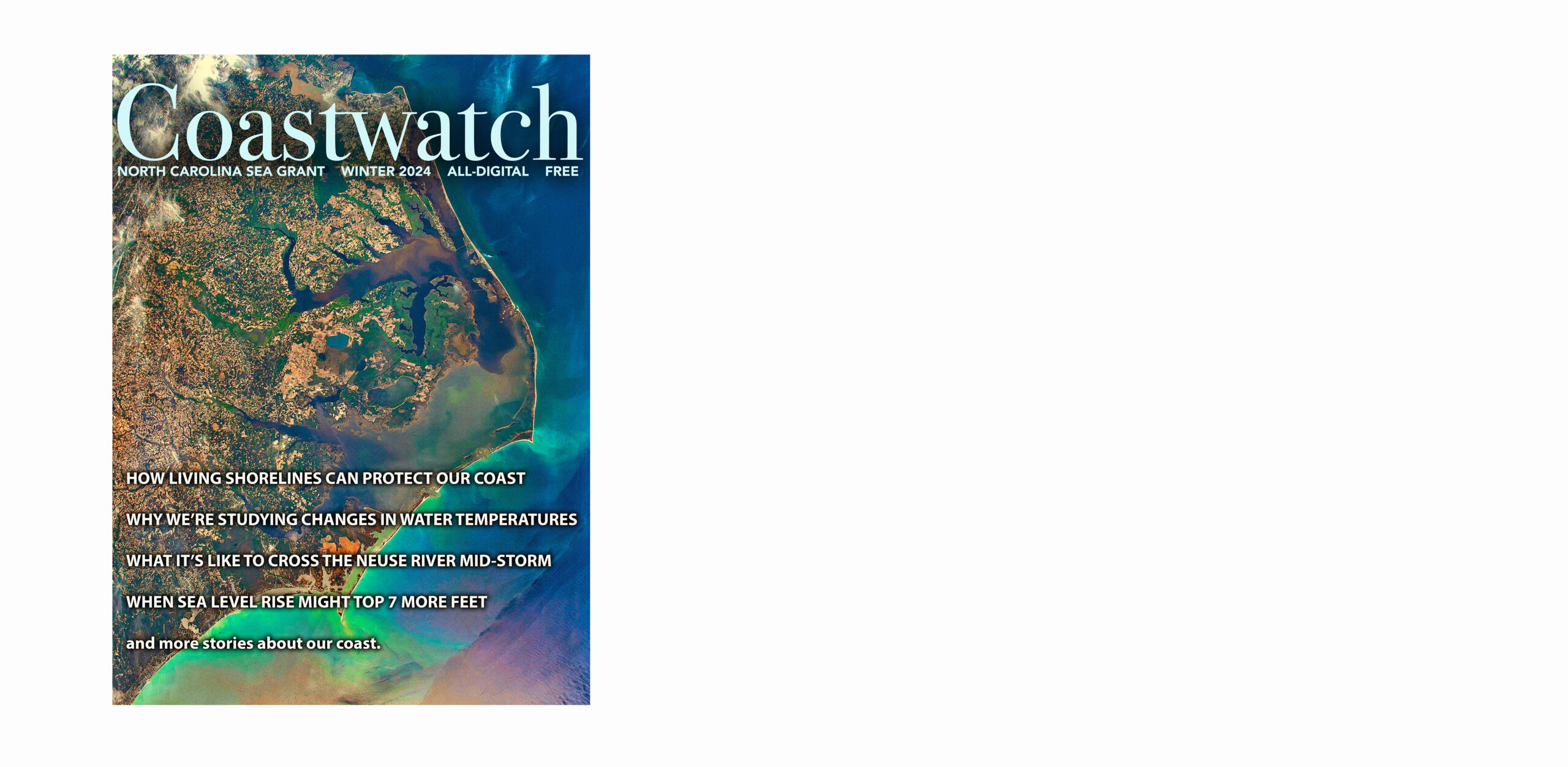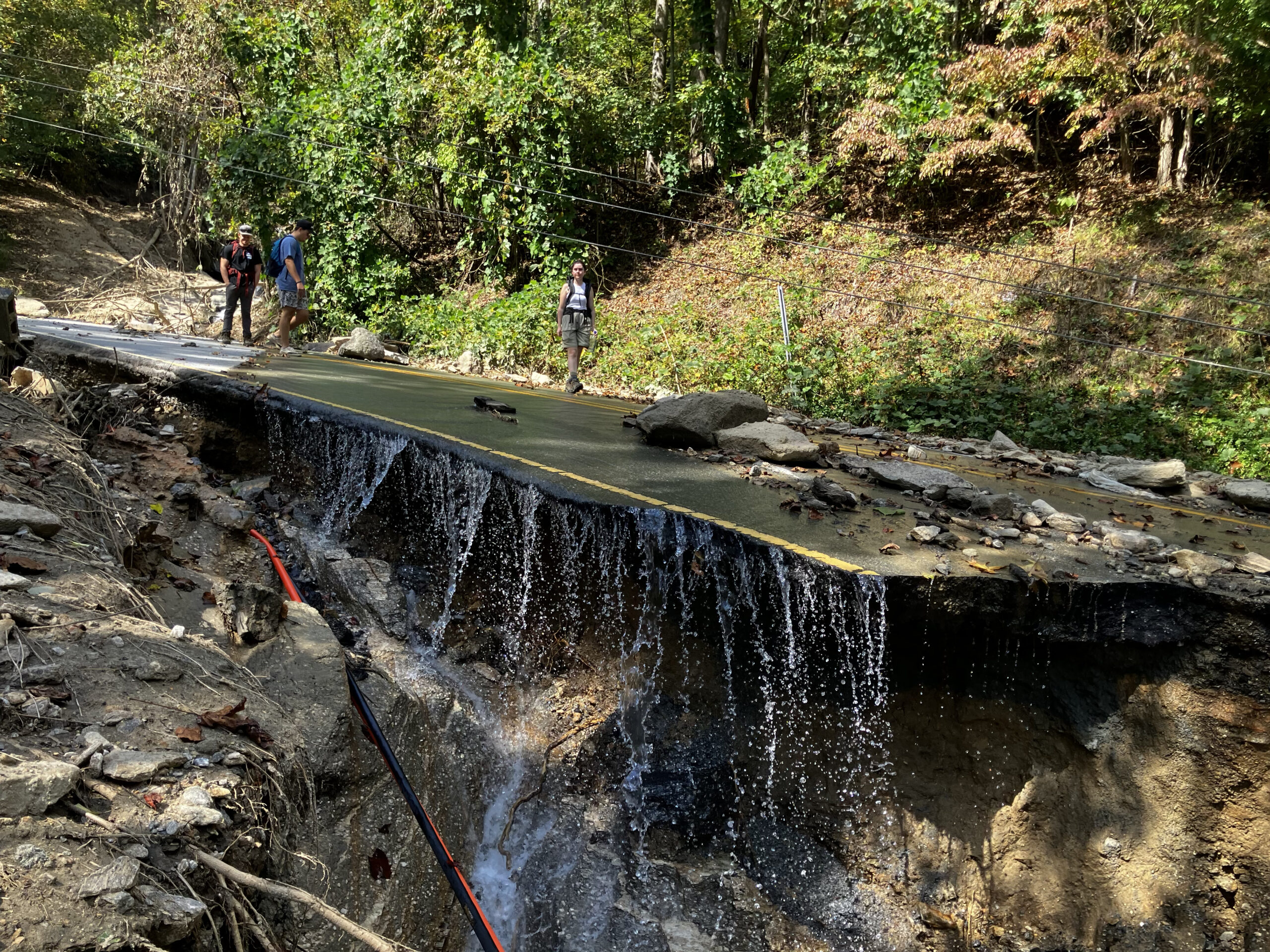Coastwatch Explores the Protective Power of Living Shorelines, Why Water Temperatures Matter, and Much More
The Winter 2024 issue is available online at no cost.

The Winter 2024 edition of the award-winning Coastwatch magazine explores the protective power of living shorelines, why water temperatures matter, and how a free mapping tool is helping small towns monitor water quality. The latest issue of North Carolina Sea Grant’s flagship publication also includes a story on how climate change could contribute to piracy, as well as Bland Simpson’s account of a stormy crossing of the Neuse River, and much more.
As climate change and the increasing coastal population bring challenges to the protection of our state’s coastal habitats and communities, living shorelines provide an effective solution — and it’s never been easier to build them. Dan DiNicola, Coastwatch’s science and digital media editor, tells the story with his latest video, Shifting Shores.
A new Sea Grant research project is looking at long-term trends in water temperatures in NC estuaries — changes that could bring new species to our coast. Coastwatch associate editor Marlo Chapman explores the many forces at play in Degrees of Change: Why Water Temperatures Matter.
“We are not afraid to lose some money to find the right approaches to getting North Carolina seafood to the people who want it,” says Nathan King of Seaview Crab Company. King offers his take on the ins and outs of the industry in Behind the Business: Perspectives from a Seafood Insider.
Are we accidentally catching more sea turtles than we thought? Sea Grant fisheries extension specialist Sara Mirabilio reveals new findings in this issue’s Naturalist’s Notebook.
Longtime Coastwatch contributor Bland Simpson, our state’s oft-honored voice of the coast, also returns with a new tale — an account of a storm-ridden passage in Crossing the Mighty Neuse.
Sea Grant communicator Annie Grants shows how a free mapping tool is helping small NC towns meet water quality requirements in Bridging the Digital Divide.
In Sixty Miles Off Shore, Sea Grant fellow David Hugo shares his experience aboard a science vessel — deploying traps, analyzing fish, and acclimating to life on the Atlantic.
Is climate change creating more. . . pirates? New research that suggests dwindling fish populations from warming waters could increase maritime crime.
Are hybrid constructed wetlands part of the solution for North Carolina’s impaired watersheds? Coastwatch associate editor Alexa Cortes explores how an alternative method of wastewater treatment could help the Tar-Pamlico recover.
This issue’s Vital Signs excerpts a NOAA report that projects that U.S. sea levels will increase the most along the East Coast and Gulf Coast — and that a failure to curb emissions could raise waters up to seven more feet by the end of the century.
Are fish noisier today than they used to be? You can listen for yourself. A research team has captured the underwater soundscape and compared it to recordings that the U.S. Navy made decades ago.
And, last, for generations the Chicamacomico lifesaving station, which celebrates its 150th anniversary this year, was known for daring rescues of shipwrecked crews and passengers off Cape Hatteras.
Katie Mosher first chronicled the station’s place in coastal lore for our Winter 2000 issue, and we republish her article here — both to commemorate the station’s anniversary and to celebrate the author’s outstanding service on behalf of Sea Grant, which comes to a close, after more than 25 years, with this issue of Coastwatch.
The Winter 2024 issue is only available online. Coastwatch returns in print with the Spring 2024 issue in April.
###
Coastwatch: ncCoastwatch.org
Subscribe: go.ncsu.edu/Subscribe-Now. All new subscriptions begin with the Spring 2023 issue.
Permissions: Some content that appears in Coastwatch is available to republish. Email dmshaw@ncsu.edu.
- Categories:


